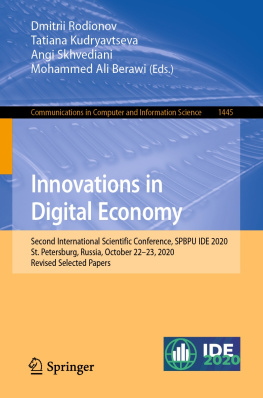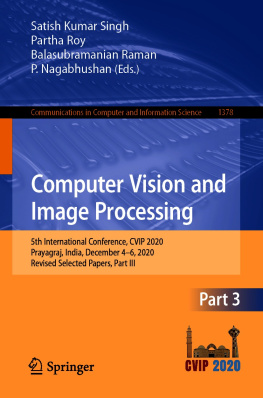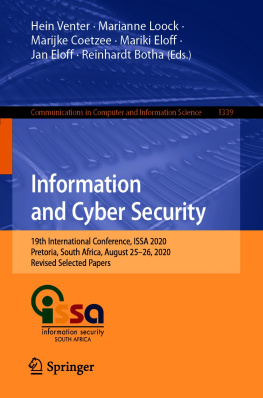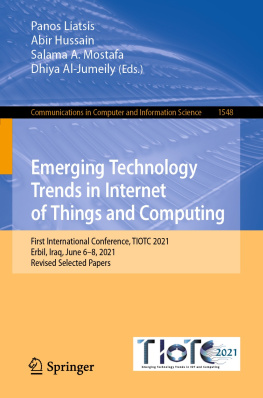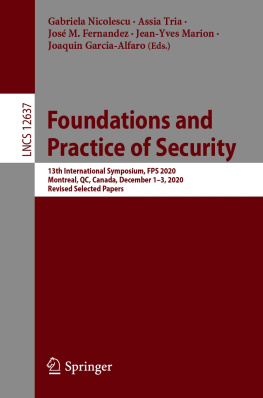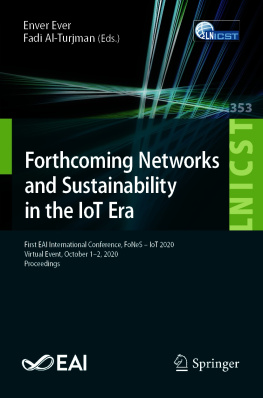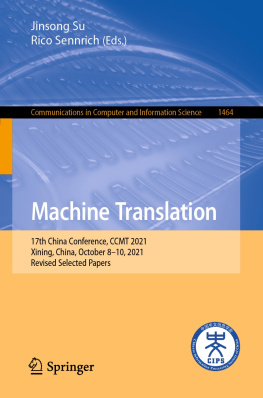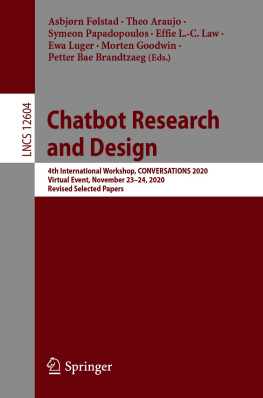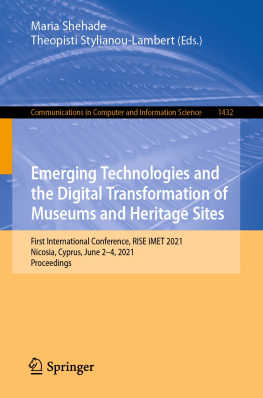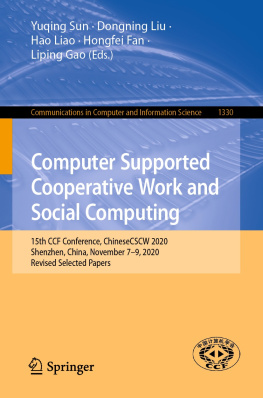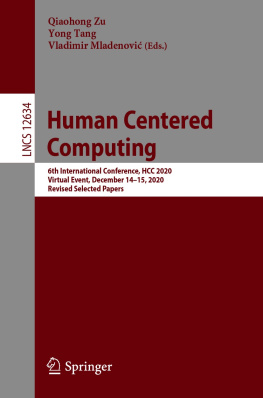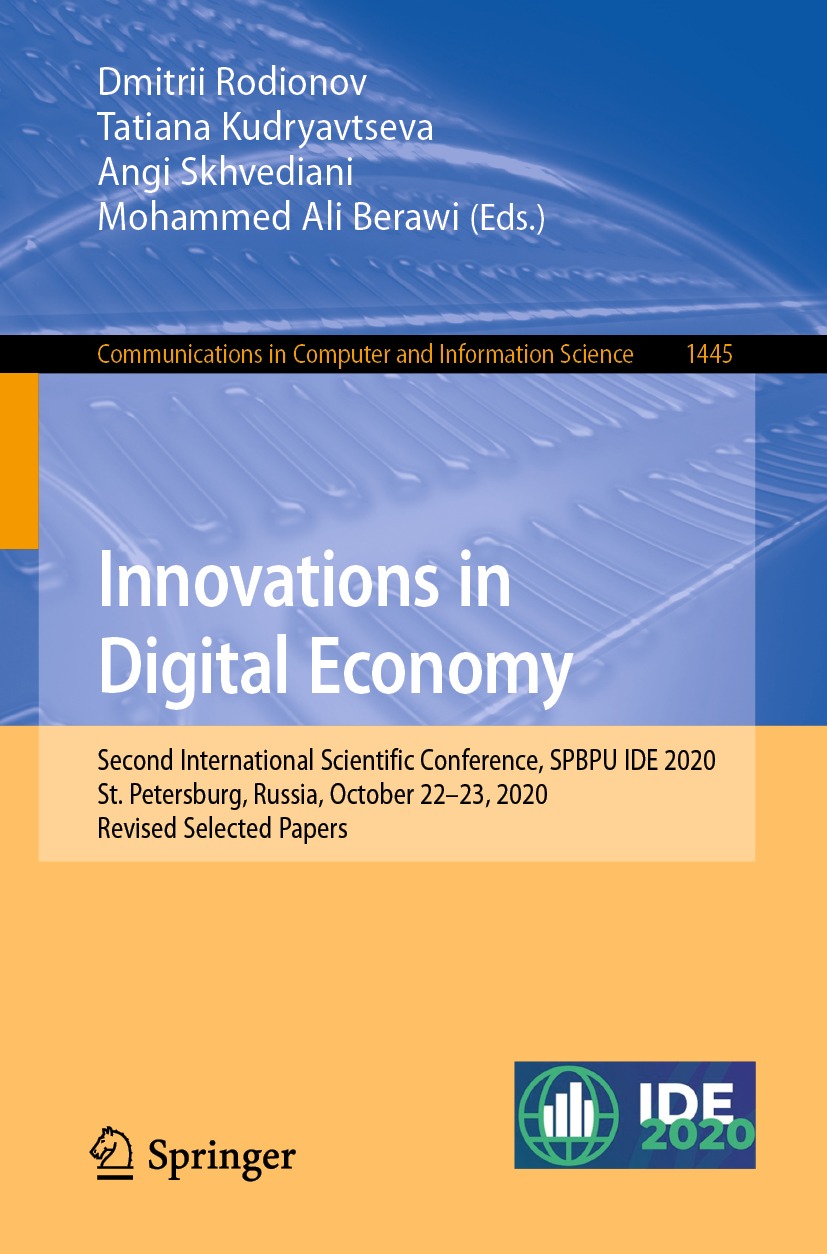Volume 1445
Communications in Computer and Information Science
Editorial Board
Joaquim Filipe
Polytechnic Institute of Setbal, Setbal, Portugal
Ashish Ghosh
Indian Statistical Institute, Kolkata, India
Raquel Oliveira Prates
Federal University of Minas Gerais (UFMG), Belo Horizonte, Brazil
Lizhu Zhou
Tsinghua University, Beijing, China
More information about this series at http://www.springer.com/series/7899
Editors
Dmitrii Rodionov , Tatiana Kudryavtseva , Angi Skhvediani and Mohammed Ali Berawi
Innovations in Digital Economy
Second International Scientific Conference, SPBPU IDE 2020, St. Petersburg, Russia, October 2223, 2020, Revised Selected Papers
1st ed. 2021

Logo of the publisher
Editors
Dmitrii Rodionov
Peter the Great St. Petersburg Polytechnic University, St. Petersburg, Russia
Tatiana Kudryavtseva
Peter the Great St. Petersburg Polytechnic University, St. Petersburg, Russia
Angi Skhvediani
Peter the Great St. Petersburg Polytechnic University, St. Petersburg, Russia
Mohammed Ali Berawi
University of Indonesia, Depok, Indonesia
ISSN 1865-0929 e-ISSN 1865-0937
Communications in Computer and Information Science
ISBN 978-3-030-84844-6 e-ISBN 978-3-030-84845-3
https://doi.org/10.1007/978-3-030-84845-3
Springer Nature Switzerland AG 2021
This work is subject to copyright. All rights are reserved by the Publisher, whether the whole or part of the material is concerned, specifically the rights of translation, reprinting, reuse of illustrations, recitation, broadcasting, reproduction on microfilms or in any other physical way, and transmission or information storage and retrieval, electronic adaptation, computer software, or by similar or dissimilar methodology now known or hereafter developed.
The use of general descriptive names, registered names, trademarks, service marks, etc. in this publication does not imply, even in the absence of a specific statement, that such names are exempt from the relevant protective laws and regulations and therefore free for general use.
The publisher, the authors and the editors are safe to assume that the advice and information in this book are believed to be true and accurate at the date of publication. Neither the publisher nor the authors or the editors give a warranty, expressed or implied, with respect to the material contained herein or for any errors or omissions that may have been made. The publisher remains neutral with regard to jurisdictional claims in published maps and institutional affiliations.
This Springer imprint is published by the registered company Springer Nature Switzerland AG
The registered company address is: Gewerbestrasse 11, 6330 Cham, Switzerland
Preface
The International Scientific Conference on Innovations in Digital Economy, SPBPU IDE 2020, was held at the Peter the Great St. Petersburg Polytechnic University, St. Petersburg, Russia, during October 2223, 2020. This conference was conducted jointly by the Graduate School of Industrial Economics (GSIE) at the Peter the Great St. Petersburg Polytechnic University (SPbPU) and the Center for Sustainable Infrastructure Development (CSID) at the Universitas Indonesia (UI).
The SPBPU IDE 2020 conference brought together experts from academia and industry to uncover challenges and solutions regarding the digital transformation of economic systems. As it took place during the COVID-19 pandemic, our conference was conducted online to minimise the risk of illness spreading among our participants. Nevertheless, we tried to create an atmosphere which facilitated communication and knowledge exchange among our participants on the topic of the digital economy. During the conference, we discussed both purely scientific and applied research results.
The plenary meetings agenda included presentations by key conference speakers. One of these was Dirk Nitzsche, Senior Lecturer at Cass Business School, who presented a report on the development prospects of the fintech industry, focusing on an overview of the opportunities and threats as well as the effectiveness of the implementation of modern technologies in the financial sector. Tatiana Kudryavtseva, Associate Professor at the Graduate School of Engineering and Economics at the Institute of Industrial Management, Economics and Trade, SPbPU, and Angi Skhvediani, a research assistant at the same institute, presented a case study on the implementation of modern technology to improve the masters program in digital economy and business analytics at the Graduate School of Industrial Economics.
Several special events took place during the conference. The first event was organised by the editorial board of the International Journal of Technology. Mohammed Ali Berawi, Associate Professor and Director of the Center for Sustainable Infrastructure Development (CSID) at the Universitas Indonesia, and Managing Editor Nyoman Suwartha gave a special lecture entitled Writing and Publishing Scientific Articles, focusing on the preparation, writing and publication of journal articles. The second event was a round-table discussion entitled End-to-end Technologies in Industry organised by the Industrial Systems of Streaming Data Processing Laboratory of the National Technological Initiative (NTI) SPbPU Center with the participation of its industrial and technological partners. The third event was a round-table discussion held to explore the topic of cross-border cooperation between the regions of St. Petersburg, Leningrad Oblast and south-eastern Finland using digital tools. The Inclusive Cross-border Business Networking of Tomorrow (INCROBB) project was launched by the Lappeenranta University of Technology as a leading partner, along with the Graduate School of Industrial Economics (GSIE) at the Peter the Great St. Petersburg Polytechnic University (SPbPU), the St. Petersburg Chamber of Commerce and Industry, SaimaanVirta and Etel-Karjalan Yrittjt ry. During this event, participants discussed problems with, and ways to facilitate, cross-border cooperation. One of the main suggestions was the development of a website where freelancers and companies from different countries can help each other to establish cross-border cooperation.
There were 117 submissions to the conference in total. All submitted papers passed a four-stage review process. At the first stage, all papers were evaluated and reviewed by the conference or Program Committee co-chairs. At the second stage, papers were evaluated and reviewed by at least two reviewers or a conference Program Committee member. At the third stage, we conducted technical reviews and checked papers for plagiarism, mastery of the English language and overall structure. This resulted in a pool of 63 high-quality papers presenting the best practices and scientific results in the conference topics. Out of these papers, 14 were recommended for publishing in CCIS after additional review and significant extension. Nine papers successfully passed this additional review process and were accepted for inclusion in the CCIS proceedings. These papers were divided into three sections.

